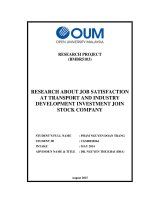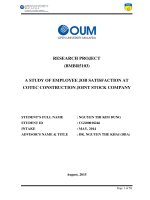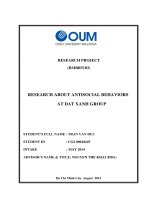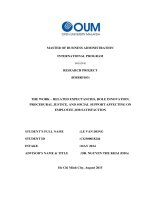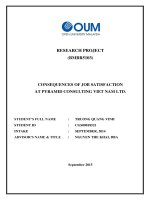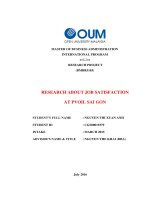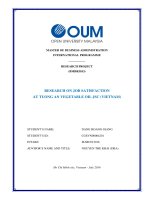Research about job satisfaction at viettravel (vietnam)
Bạn đang xem bản rút gọn của tài liệu. Xem và tải ngay bản đầy đủ của tài liệu tại đây (8.16 MB, 60 trang )
RESEARCH PROJECT
(BMBR5103)
RESEARCH
ABOUT JOB SATISFACTION AT VIETRAVEL
(VIETNAM)
STUDENT’S FULL NAME
: NGUYEN THUY TIEN
STUDENT ID
: CGSVN000015850
INTAKE
: SEPTEMBER 2013
ADVISOR’S NAME & TITLE
: NGUYEN THE KHAI (DBA)
HO CHI MINH CITY, AUGUST 2016
Acknowledgments
It is not a single doubt that pursuing this research is not only hard but also meaningful
experience. This could be compared with climbing a high peak, step by step, paired with
hardships, frustration, encourangement, trust and unlimited help from numerous people
altogether. When I find myself admiring the view from the top, I realize that teamwork
leads me all over there. Though it would not be enough to express my appreciation in
words to all those people who support me, I still desire to convey my special thanks to
all these people.
I would like to express my gratitude to all those who have made this dissertation
possible. My deepest gratitude goes first and foremost to my lecturer Dr. Nguyen The
Khai (DBA) for his full support, expert guidance, understanding and encouragement
througout my study and research. Without his incredible patience and timely wisdom
and counsel, my research would have been a frustrating and overwhelming pursuit.
My thanks are also extended to Vietravel – Asia’s Leading Tour Operator for their
unceasing support from the very first beginning accompanied by their willingness
shown to provide a solid grounding in database needed in the accomplishment of this
research.
Last but not least, I also place on record, my sense of gratitude to my parents, friends
and colleagues for their endless support, enduring love, constant guidace, motivation
and ecouragement.
1
!!!!!!!!!!!!ABSTRACT
5!
PART ONE INTRODUCTION
1 About Vietravel
Brandname Calibration
History
Vietnam Offices Network
Scope Business
Vision, Mission & Core Values
Management Formality
Organization Structure
Leadership Style
2 Research Objective
3 Research Scope
6
6
6
6
6
8
8
8
8
9
9
11
11
12
12
12
14
14
15
4 Limitation of the Research
PART TWO LITERATURE REVIEW
5 Definition constructs
Job Satisfaction
Supervisory Support
Developmental Experiences
Fairness in Skill – Based Pay
Perceived Ability – Job Fit
6 Argument for the relationship among
the constructs
16
16
16
17
17
17
18
18
18
18
19
X theory and Y theory
Maslow’s needs theory
19
23
25
28
29
Herzberg’s two factor theory
Hackman & Oldham’s Job
Characteristics
McClelland’s needs theory
Stacey Adam’s Equity Theory
2
30
31
PART THREE METHODS
7 Data collection
33
33
33
38
Design Template Scale
Data collection progress
8 Data Analysis
39
PART FOUR RESULTS
9 Cronbach’s Alpha
Cronbach’s Alpha standard applied
Cronbach’s Alpha
40
40
40
40
10 Statistics information
42
42
43
Descriptive statistics
Correlation statistics
11 Hypotheses testing
44
Hypothesis proposed (H1)
44
45
45
46
Hypothesis proposed (H2)
Hypothesis proposed (H3)
Hypothesis proposed (H4)
PART FIVE CONCLUSIONS
12 Discussion
47
47
47
48
13 Limitation of research
14 Forecast recommendation
REFERENCES
49
51
APPENDIX
Appendix 1: Survey
51
56
Appendix 2: Presentation
3
!
FIGURES & TABLES
FIGURE
Figure 1
Figure 2
Figure 3
Figure 4
Figure 5
Figure 6
TABLE
Table 1
Table 2
Table 3
Table 4
Table 5
Table 6
Table 7
Table 8
Table 9
Table 10
Table 11
Table 12
Table 13
Table 14
Table 15
Table 16
Table 17
Table 18
Table 19
Table 20
Table 21
Table 22
Table 23
Facets of Job Satisfaction
Maslow’s Hierarchy of Need
Herzberg’s Two Factor Theory
Hackman & Oldham’s Job Characteristics
McCleeland’s Needs Theory
Adam’s Equity Theory Diagram
17
24
26
29
30
31
32
Job Satisfaction Scale
Supervisory Scale
Developmental Experiences
Fairness in Skill – Based Pay
Perceived Ability Job Fit
Timetable for data collection progress
Cronbach’s Alpha
Cronbach’s Alpha of Job Satisfaction
Cronbach’s Alpha of Supervisory
Support
Cronbach’s Alpha of Developmental
Experiences
Cronbach’s Alpha of Fairness in Skill –
Based Pay
Cronbach’s Alpha of Perceived Ability
Job Fit
Descriptive statistics
Value of Coefficients
Correlation statistics
Model Summary of H1
Coefficients of H1
Model Summary of H2
Coefficients of H2
Model Summary of H3
Coefficients of H3
Model Summary of H4
Coefficients of H4
33
35
36
37
38
38
40
40
41
41
4
41
42
42
42
43
43
44
44
45
45
45
46
46
46
ABSTRACTS
Job satisfaction is regarded as one of the most complex issues facing today’s managers
when it comes to managing their employees. The subject matter of this research centers
on observing and analyzing a series of factors which influences satisfaction level among
the workforce of Vietravel (VTV).
The study employed research strategy in quantitative terms. The subjects of this certain
study were comprised of 500 employees working for VTV. The primary data was
collected using a structured questionnaire with the aid of Statistical Package for Social
Sciences (SPSS) for data analysis statistically, 500 questionnaires were distributed and
270 valid ones were returned. The questionnaires were completed voluntarily by all
respondents. The findings of the study revealed that the joint effect of variables can be
grouped as independent ones (Supervisory Support, Procedural Justice, Fairnness in
Skill – Based Pay and Perceived Ability – Job Fit) which might influence Job
Satisfaction relative to Expectation – the dependent one.
Based on the findings of this study, it is highly recommended that the management
should try as much as possible to give constant attention to factors that can enhance job
satisfaction. Human resource is considered as the most fundamental asset for any
organization, not mention VTV. Therefore, this study could be much of the tool used by
the higher – ups in VTV to better comprehend the satisfaction level of employees and
how they can encourage their employees to carry out their job proficiently and
effectively.
Key words: Job Satisfaction relative to Expectation, Supervisory Support, Procedural
Justice, Fairness in Skill – Based Bay and Perceived Ability – Job Fit.
PART ONE: INTRODUCTION
5
About Vietravel
Brandname Calibration
The triangle with 03 apexes and 03 sides that an switch places and roles to each other,
this shows the absolute balance in an active market and non – stop growing world.
The unfinished circle demonstrates that knowledge of humankind cannot reach the
absolute truth of “The truth, the good and the beautiful”. This reminds tourist operators
have to learn, to improve constantly in order to deliver the best product & services to
meet the customer’s travelling needs that are more gradually diversified from customers.
The four lines divine the circle into 5 proportions which represent for 5 continents, this
expresses the aspiration to reach out and globally develop all around the world.
History
The Vietnam Travel and Marketing Transport Joint-stock Company (Vietravel) was
established on the basis of the Centre of Tourism – Marketing and Investment Services
(Tracodi Tourmis) under the Ministry of Transport.
In the initial days after Vietravel was established in December, 1995 it faced many
difficulties in the tourist market, lacking employees, funds and facilities. But with a
dynamic, determination to overcome difficulties and an effective business strategy, the
company has gradually developed.
6
Vietravel has been a member of Domestic and International Tourism Organizations:
- VCCI (Vietnam Chamber of Commerce and Industry)
- VITA (Vietnam Tourism Association)
- HTA (HCMC Tourism Association)
- HUBA (HCMC Union of Business Association)
- ASTA (American Society of Travel Agents)
- PATA (Pacific Asian Travel Association)
- IATA (International Air Transport Association)
- JATA (Japan Association of Travel Agents)
- IAGTO (International Association of Golf and Tour Operators)
- ATTA (Adventure Travel Trade Association)
7
Vietravel Offices Network
Scope Business
- International and Domestic Tourism
- E- tour (E – commerce)
- Organizing MICE tour, Golf tour & Team building
- Air/train ticket service
- Services for self – drive car rental
- Tour guide & Interpreter services
- Marine Transporting and Mediating Agency
- Foreign currency exchange service
- Overseas study consultant service
- Events Organizing
- Hotel Reservation service
- Career Training Center
8
- Labor Export Service
- Civil Construction Enterprise
Vision, Mission and Core values
Vision: Reach out to the world’s height
Vietravel has been honored with “Vietnam’s Leading Tour Operator” and “Vietnam’s
Leading Travel Agency” in 2015 organized by World Travel Awards – “Oscars” of the
travel industry. With a long-term strategy and an emphasis on training human resources
and investing in infrastructure and information technology to improve customer
services, Vietravel will continue to conquer new heights and reach out to regional and
international markets.
Mission: The Pioneer
Since our inception, Vietravel has been a pioneer in the travel industry. They offer a
wide variety of vacations and other travel opportunities to countless destinations.
Vietravel has always worked very hard to bring their valued clientele the best the travel
industry has to offer.
Core Values:
EXPERIENCE: After 20 - year's operations in the field of international and domestic
tourism, Vietravel has gained much experience and been confident of our quality
services.
PROFESSIONALISM: The fast, strong and sustained growth of Vietravel is based on
two important elements: an effective business structure, well-trained and highly
experienced staff with in-depth knowledge of tourism as well as excellent language
skills.
9
Moreover, the professionalism of Vietravel is displayed by the application of Ecommerce into their business activities. The management structure and customer care
programs are also applied with quality management standards.
PERSONAL CARE: Vietravel with a wide network of branches, offices and affiliates
throughout Vietnam and overseas, can easily approach our customers and satisfy their
needs accordingly wherever they are. In addition, we have a database which has been
updated regularly with an abundant list of hotels, restaurants, resorts, entertainments.
Also new destinations have been constantly added by the Product Department in order
to bring new experiences and varied choices to our customers.
ADDED VALUES: those are the values exceeding the hope of customers. Through our
tour programs, members in family will have chances to get closer and understand each
other more than ever; colleagues will collaborate with one another firmer. Gifts will also
be offered through the programs: “Together win”, “VIP club” or “Membership card”.
Above all of those mentioned values are the charity programs combined into tour
programs. With Vietravel, tourism is not only for sightseeing and relaxing but also
sharing difficulties and responsibilities with the community.
SUBLIMATE EMOTIONS FOR EACH CUSTOMER: that is the impression
Vietravel will definitely bring to the customer once buying Vietravel’s services When
taking tours with Vietravel, customers will surely have opportunities to experience it
all: from exploring new lands new people with their history and cultures, to their typical
lifestyles and cuisines…..
10
YOUNG & DYNAMIC: With all their enthusiasm and creativity, our staff tiredlessly
strive to bring to customers a wide range of new products with the best quality and
competitive price.
24 - HOUR ASSISTANCE: Vietravel provides customers with 24/7 and 365 days
assistance through our hotline numbers, even in Tet and national holidays.
QUALITY: We commit to bringing the highest standard services and conveniences
beyond customers’ expectations. We will continuously update our new exciting tour
programs and services at the best prices, just to carry out our business mission “Quality
is always our first priority”.
Management Formality
11
Organization Structure
Leadership style
12
Over the course of the long career, Mr. Nguyen Quoc Ky – Chairman & General
Director of Vietravel, accompanied by other recognized deputy general directors have
been able to handle the good times and bad by never lacking confidence in their ability
to get the job done. This could not be carried out without the signature leadership style
shaped by these great leaders.
Democratic Leadership: Vietravel’s employees are given the opportunity to
participate, ideas are exchanged freely, and discussion is encouraged. While the
democratic process tends to focus on group equality and the free flow of ideas, the lead
of the group is still there to offer guidance and control.
Coaching Leadership: Vietravel supports their subordinates identify their unique
advantages and disadvantages and tie them to their career aspirations. They encourage
employees to construct long – term goals and help them conceptualize a plan for
attaining them.
Visionary Leadership: Vietravel excels at creating a positive and inspirational vision
of the future and conveying that vision in an engaging manner that attracts committed
employees. They understand the need for meaning and purpose in employees, and uses
that need to inspire them to achieve more and to build better futures. The subordinates
get motivated by the defined vision and feel a sense of solidarity within the group due
to the common sense.
Research problem statement
Vietravel is 100% Vietnamese enterprise but it has expanded branches overseas
(Thailand, Singapore, America, Australia, France,…) Currently, in the context of the
tourism industry is very tough and working environment of Vietnamese industry has
experienced too many changes, yet none researchers are working on findings obtained
13
job satisfaction in these companies. Vietravel is aggressively developing and growing
human resource, especially in the selection of right people for the right position offered
by the company. However, it appears that recruiting right people does not complete the
process, when another piece remains keeping talent employees. In other words, how to
retain key staff gives the employers a big question which needs to be answered correctly.
The Chief Executive Officer recognizes that the Job Satisfaction is considered as the
significant factor for Vietravel development since tourism industry is the huge pie
shared by coming competitors, the subordinates’ capabilities are the winning tool for
the champions. However, some factors such as Supervisory Support, Developmental
Experiences, Fairness in Skill – Based Pay and Perceived Ability – Job Fit are problems
for human resource managemet at Vietravel.
Research objectives
This purpose of this research is to find the factors which influence the Job Satisfaction
of Vietravel employees. My research will center on 3 main factors:
! Firstly: Search related information and try to define the meaning of Job
Satisfaction in Vietravel.
! Secondly: Design research model and test related factors to check the influence
between factors to access strong/weak level of each factor in the progress.
! Thirdly: Discuss and propose recommendation to improve the effectiveness and
forecast the human resources management in Vietravel next time.
Research Scope
The Scope of research is designed for the entire employees at Vietravel, including:
General Director & Chairman, Deputy General Directors & Board of Directors,
14
managers, subordinates and employees working at Vietravel & excluding: Shareholders,
Supervisory Board and employees who are under probation period or in maturity leave.
The survey scope is within the territory of Vietnam, which composes 500 employees
working in Vietravel. Contents are factors influencing Job Satisfaction and not intended
to re- structure, change and replace the employees. This survey was conducted from 1st
April to 25th June 2016.
Significance of research
This research will help CEO, Directors, managers understand and recognize the
importance of Job Satisfaction which is the most important factor to show the
effectiveness of the policy in human matter. Beside significant management, it does
improve employee loyalty to the organization and further, employees will be loyal to
the shareholders of the company, contributing to the financial strength of the company.
Limitation of the Research
This research will have some limitations due to its focus on Vietravel only. The survey
was conducted in short period of time. Besides, the survey respondents are more
qualified and different perceptions about Job Satisfaction combined with the
grammatical errors in the contents which may cause confusion for the readers.
15
PART TWO
LITERATURE REVIEW
DEFINITION CONSTRUCTS
Job Satisfaction
It was developed by Bacharach, Bamberger, and Conley (1991) which includes 5 items.
The most widely accepted theory of job satisfaction was proposed by Locke (1976), who
defined job satisfaction as “a pleasurable or positive emotional state resulting from the
appraisal of one’s job or job experiences” (Locke, 1975, p.1304). Job satisfaction has
emotional, cognitive, and behavioral components (Bernstein & Nash, 2008). The
emotional component refers to job-related feelings such as boredom, anxiety,
acknowledgement and excitement. The cognitive component of job satisfaction pertains
to beliefs regarding one's job whether it is respectable, mentally demanding /
challenging and rewarding. Finally, the behavioral component includes people's actions
in relation to their work such as tardiness, working late, faking illness in order to avoid
work (Bernstein & Nash, 2008).
Job satisfaction refers to the positive attitudes or emotional dispositions people may gain
from work or through aspects of work. Employees’ job satisfaction becomes a central
attention in the researches and discussions in work and organizational psychology
because it is believed to have relationship with the job performance.
16
Figure 1: Facets of job satisfaction (Hackman & Oldham, 1980; Smith, Kendall, &
Hulin, 1969)
Supervisory Support
The measure, developed by Greenhaus, Parasuraman, and Wormley (1990), includes 9
items to be exact. Supervisor support is defined as the extent to which leaders value their
employees’ contributions and care about their well-being. A leader with high supervisor
support is one that makes employees feel heard, valued, and cared about. Although it
sounds simple, providing this kind of support is one of the hardest transitions to make
when promoted from employee to supervisor. The move from “process expert” to
“motivational leader” is possibly one of the largest steps one can take in his/her working
life.
Developmental Experiences
The measure, developed by Wayne, Shore and Liden (1997), includes 5 items to be
obtained. Developmental Experiences (DE) are defined as an individual’s experience of
taking on demanding assignments that offer opportunity for learning and leadership. The
extent to which an assignment brings DE can depend on how the particular employee
views the opportunity in his or her own mind. Developmental assignments usually share
17
some common features: unfamiliar responsibilities, opportunity to create change, high
levels of responsibility, working across boundaries, and managing diversity.
Fairness in Skill – Based Pay
This measure, developed by Lee, Law and Bobko (1998), uses 4 items to assess fairness
in competency – skill based pay system. Management’s strategy for the organization
should be a critical determinant of the operations of the pay system. Employees with
higher skill levels receive higher pay than those with lower skill levels. Skill-based
structures link pay to the depth or breadth of the skills, abilities, and knowledge persons
acquire that are relevant to the work.
Perceived Ability – Job Fit
Ability-job fit can be defined as the "fit between the abilities of a person and the
demands of a job, or the desires of a person and the attributes of a job" (Sekiguchi,
2004). When employees perceive change programs as having a significant impact on
their job, they will have more negative attitudes towards the change. We also expect that
the extent to which employees perceive a better fit between their abilities and the revised
job demands, they will have more positive attitudes about the change. Taking these
arguments together, we propose that the relationship between individual job impact and
attitudes towards change is moderated by fit. While perceptions of job impact and fit are
related, they are conceptually distinct in that changes may or may not be a good fit with
an individual’s existing skill set. A major change will be perceived more negatively to
the extent that individuals view themselves as incapable of meeting the demands – that
is, perceive a worse fit. And to the extent that individuals are asked to incorporate
18
changes to their job – changes that do not fit with their skills and abilities – the level of
stress and uncertainty would increase.
Argument for the relationship among the constructs
X theory and Y theory
Contents
Theory X and Theory Y represent two sets of assumptions about human nature and
human behavior that are relevant to the practice of management. Theory X represents a
negative view of human nature that assumes individuals generally dislike work, are
irresponsible, and require close supervision to do their jobs. Theory Y denotes a positive
view of human nature and assumes individuals are generally industrious, creative, and
able to assume responsibility and exercise self-control in their jobs. One would expect,
then, that managers holding assumptions about human nature that are consistent with
Theory X might exhibit a managerial style that is quite different than managers who
hold assumptions consistent with Theory Y.
In the 1950s, Douglas McGregor (1906-1964), a psychologist who taught at MIT and
served as president of Antioch College from 1948-1954, criticized both the classical and
human relations schools as inadequate for the realities of the workplace. He believed
that the assumptions underlying both schools represented a negative view of human
nature and that another approach to management based on an entirely different set of
assumptions was needed. McGregor laid out his ideas in his classic 1957 article "The
Human Side of Enterprise" and the 1960 book of the same name, in which he introduced
what came to be called the new humanism.
19
McGregor argued that the conventional approach to managing was based on three major
propositions, which he called Theory X:
1.! Management is responsible for organizing the elements of productive enterprisemoney, materials, equipment, and people-in the interests of economic ends.
2.! With respect to people, this is a process of directing their efforts, motivating
them, controlling their actions, and modifying their behavior to fit the needs of
the organization.
3.! Without this active intervention by management, people would be passive-even
resistant-to organizational needs. They must therefore be persuaded, rewarded,
punished, and controlled. Their activities must be directed. Management's task
was thus simply getting things done through other people.
According to McGregor, these tenets of management are based on less explicit
assumptions about human nature. The first of these assumptions is that individuals do
not like to work and will avoid it if possible. A further assumption is that human beings
do not want responsibility and desire explicit direction. Additionally, individuals are
assumed to put their individual concerns above that of the organization for which they
work and to resist change, valuing security more than other considerations at work.
Finally, human beings are assumed to be easily manipulated and controlled. McGregor
contended that both the classical and human relations approaches to management
depended this same set of assumptions. He called the first style of management "hard"
and identified its methods as close supervision, tight controls, and coercion.
20
The hard style of management led to restriction of output, mutual distrust, unionism,
and even sabotage. McGregor called the second style of management "soft" and
identified its methods as permissiveness and need satisfaction. McGregor suggested that
the soft style of management often led to managers' failure to perform their managerial
role. He also pointed out that employees often take advantage of an overly permissive
manager by demanding more but performing at lower levels.
McGregor drew upon the work of Abraham Maslow (1908-1970) to explain why Theory
X assumptions led to ineffective management. Maslow had proposed that man's needs
are arranged in levels, with physical and safety needs at the bottom of the needs
hierarchy and social, ego, and self-actualization needs at upper levels of the hierarchy.
Maslow's basic point was that once a need is met, it no longer motivates behavior; thus,
only unmet needs are motivational. McGregor argued that most employees already had
their physical and safety needs met and that the motivational emphasis had shifted to the
social, ego, and self-actualization needs. Therefore, management had to provide
opportunities for these upper-level needs to be met in the workplace, or employees
would not be satisfied or motivated in their jobs.
Such opportunities could be provided by allowing employees to participate in decision
making, by redesigning jobs to make them more challenging, or by emphasizing good
work group relations, among other things. According to McGregor, neither the hard
style of management based on the classical school nor the soft style of management
inspired by the human relations movement were sufficient to motivate employees. Thus,
he proposed a different set of assumptions about human nature as it pertains to the
workplace.
21
McGregor put forth these assumptions, which he believed could lead to more effective
management of people in the organization, under the rubric of Theory Y. The major
propositions of Theory Y include the following:
1.! Management is responsible for organizing the elements of productive enterprisemoney, materials, equipment, and people in the interests of economic ends.
2.! People are not by nature passive or resistant to organizational needs. They have
become so as a result of experience in organizations.
3.! The motivation, potential for development, capacity for assuming responsibility,
and readiness to direct behavior toward organizational goals are all present in
people-management does not put them there. It is a responsibility of management
to make it possible for people to recognize and develop these human
characteristics for themselves.
4.! The essential task of management is to arrange organizational conditions and
methods of operation so that people can achieve their own goals by directing their
efforts toward organizational objectives.
Thus, Theory Y has at its core the assumption that the physical and mental effort
involved in work is natural and that individuals actively seek to engage in work. It also
assumes that close supervision and the threat of punishment are not the only means or
even the best means for inducing employees to exert productive effort. Instead, if given
the opportunity, employees will display self-motivation to put forth the effort necessary
to achieve the organization's goals. Thus, avoiding responsibility is not an inherent
quality of human nature; individuals will actually seek it out under the proper conditions.
Theory Y also assumes that the ability to be innovative and creative exists among a
22
large, rather than a small segment of the population. Finally, it assumes that rather than
valuing security above all other rewards associated with work, individuals desire
rewards that satisfy their self-esteem and self-actualization needs.
Although McGregor did not believe that it was possible to create a completely Theory
Y-type organization in the 1950s, he did believe that Theory Y assumptions would lead
to more effective management. He identified several approaches to management that he
felt were consistent with the precepts of Theory Y. These included decentralization of
decision-making authority, delegation, job enlargement, and participative management.
Job enrichment programs that began in the 1960s and 1970s also were consistent with
the assumptions of Theory Y.
In the 1970s, 1980s, and 1990s, McGregor's conceptualization of Theory X and Theory
Y were often used as the basis for discussions of management style, employee
involvement, and worker motivation. Empirical evidence concerning the validity of
Theory X and Theory Y, however, was mixed.
Maslow’s needs theory
Contents
Maslow's hierarchy of needs theory states that people have a pyramid hierarchy of needs
that they will satisfy from bottom to top. Starting from mere physiological subsistence
the Maslow hierarchy of needs covers belonging to a social circle to pursuing your talent
through self-actualization. Important to the hierarchy of needs theory is that Maslow felt
that unfulfilled needs lower on the ladder would inhibit the person from climbing to the
next step.
23
The pyramid of needs is divided into two categories: deficiency needs (physiological
and safety) and growth needs (belonging, self-esteem and self-actualisation). If the
deficiency needs aren't satisfied, the person will feel the deficit and this will stifle his or
her development.
Figure 2: Maslow’s Hierarchy of Needs
Previous Research
Tang, T.L.; Ibrahim, A.H.; West, W.B (2002). “Effects of war – related stress on the
satisfaction of human needs: The United States and the Middle East”. International
Journal of human needs: The United States and the Middle East”. International Journal
of Management Theory and Practices 3 (1): 35 – 53
Cianci, R.; et al (2003). “Maslow’s hierarchy of needs: Does it apply in a collectivist
culture”. Journal of Applied Management and Entrepreneurship 8 (2): 143 – 161.
24

